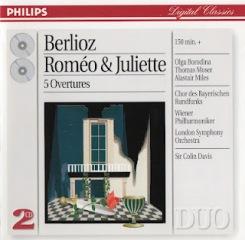Berlioz - Roméo et Juliette (Colin Davis) [1993]
Berlioz - Roméo et Juliette (Colin Davis) [1993]

CD1 1 Introduction 2 Prologue: "D'Anciennes Haines Endormies" 3 Strophe 1: "Premiers Transports Que Nul N'Oublie" 4 Heureux Enfants Aux Coers De Flamme 5 Récitatif Et Scherzetto: "Bientôt De Roméo" 6 Roméo Seul 7 Grande Fete Chez Les Capulets 8 Ohé! Capulets! Bonsoir, Bonsoir! 9 Scene D'Amour 10 La Reine Mab, Ou La Fée Des Songes 11 Jetez Des Fleurs 12 Romeo Au Tombeau Des Capulets CD2 1 Finale. Quoi! Roméo De Retour! 2 Finale.Pauvres Enfants Que Je Pleure 3 Finale.Jurez Donc Par L'Auguste Symbole 4 Ouverture „Beatrice et Benedict” 5 Overture "Le Roi Lear" 6 Overture "Les Francs-Juges", Op.3 7 Overture "Waverley", Op.1 8 Overture "Le Corsaire", Op.21 Olga Borodina - mezzo-soprano Thomas Moser - tenor Alastair Miles - bass Chor des Bayerischen Rundfunks Wiener Philarmoniker London Symphony Orchestra Sir Colin Davis – conductor
An interesting aspect of Colin Davis’ 1993 Musikverein Romeo et Juliette is how he cajoles the Vienna Philharmonic (of all the world’s great orchestras, surely that most set in its ways) into assuming a French-sounding identity. You notice it time and again, in more sharply differentiated woodwind textures (darker, woodier clarinets, airy “will-’o-the wisp” flutes, gruff bassoons) and idiomatic brass-playing (the trumpets have a full-throated plumpness and cornet-like vibrato), none of it what you’d usually expect to hear.
Davis has capable vocal soloists, too, but the performance overall seems less hard-hitting than his LSO account of 1968, which remains preferable in many ways. The big scenes, notably the “Capulet’s Ball”, the “Love Scene”, and “Juliette’s Cortège”, had more pictorial immediacy before, though the Vienna Philharmonic obviously enjoys the virtuoso opportunities of the “Queen Mab” scherzo.
On the other hand, the overtures completing Disc 2 are wholly electrifying. With the LSO on peak form, Le Corsaire sounds incredibly exciting, while King Lear has gripping forcefulness and majesty. And there’s no better Waverley on disc either, with Davis securing faultless orchestral ensemble, even from the cellos and basses in their notoriously difficult linking passages mid-way through. There’s also a resplendent Les Francs Juges, stunningly played, and new transfers of the already superb Philips masters impart even more sheen and brilliance. --- classicstoday.com , [9/25/2002]
download:
Zmieniony (Niedziela, 25 Sierpień 2013 16:17)








